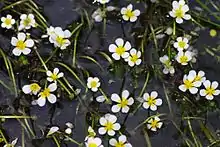Ranunculus trichophyllus
Ranunculus trichophyllus, the threadleaf crowfoot,[2] or thread-leaved water-crowfoot,[3][4] is a plant species in the genus Ranunculus, native to Europe, Asia and North America.
| Ranunculus trichophyllus | |
|---|---|
 | |
| Scientific classification | |
| Kingdom: | Plantae |
| Clade: | Tracheophytes |
| Clade: | Angiosperms |
| Clade: | Eudicots |
| Order: | Ranunculales |
| Family: | Ranunculaceae |
| Genus: | Ranunculus |
| Species: | R. trichophyllus |
| Binomial name | |
| Ranunculus trichophyllus Chaix ex Vill. | |
| Synonyms | |
| |
It is a herbaceous annual or perennial plant generally found in slow flowing streams, ponds, or lakes. The daisy-like flowers are white with a yellow centre, with five petals.[5] It is similar in form to Ranunculus fluitans (river water-crowfoot), apart from flower petal number, thread-leaved has on 5 petals and shorter leaves, as thread-leaved prefers slower flowing waters. It also has rounded seed heads which become fruits covered with bristles.[5] The segmented leaves and the plants ability to photosynthesis underwater have been studied.[6]
Taxonomy
It was first described and published by the French naturalist and botanist Dominique Villars in his book 'Histoire des plantes du Dauphiné' Vol.3 on page 335 in 1786.[1][7]
The species epithet trichophyllus is Latin for 'hairy leaves'.[8]
In American it is also commonly known as the 'white water crow foot'.[9] The Icelandic name of this species is Lónasóley.[10]
Distribution and habitat
The plant is found in most of the Northern Hemisphere,[4] from the United States, Europe and the Mediterranean, east through Siberia, the Caucasus, the Middle East, the Himalayas, Kazakhstan and Mongolia to Kamchatka in Russia, also in Japan, China and Korea.[11] It is even found in the lakes and ponds of Mount Everest.[12]
Range
It grows in freshwater,[13] found in dune slacks and drainage ditches to ponds, lakes, streams and slow-flowing rivers. It is normally found at around 3,000 m (9,800 ft) above sea level.[11]
References
- "Ranunculus trichophyllus Chaix ex Vill. is an accepted name". 23 March 2012. theplantlist.org. Retrieved 27 October 2017.
- "Ranunculus trichophyllus". Natural Resources Conservation Service PLANTS Database. USDA. Retrieved 18 October 2015.
- "BSBI List 2007". Botanical Society of Britain and Ireland. Archived from the original (xls) on 2015-01-25. Retrieved 2014-10-17.
- "Ranunculus trichophyllus". rhs.org.uk. Retrieved 27 October 2017.
- Reader's Digest Field Guide to the Wild Flowers of Britain. Reader's Digest. 1981. p. 30. ISBN 9780276002175.
- Rascio, N.; Cuccato, F.; Dalla Vecchia, F.; La Rocca, N.; Larcher, W. (February 1999). "Structural and functional features of the leaves of Ranunculus trichophyllus Chaix., a freshwater submerged macrophophyte". Plant, Cell and Environment. 22 (2): 205–212. doi:10.1046/j.1365-3040.1999.00394.x.
- "Ranunculaceae Ranunculus trichophyllus Chaix". ipni.org. Retrieved 27 October 2017.
- Archibald William Smith A Gardener's Handbook of Plant Names: Their Meanings and Origins, p. 339, at Google Books
- Elaine Nowick Historical Common Names of Great Plains Plants, with Scientific Names Index ..., p. 365, at Google Books
- "elements: Ranunculus trichophyllus, thread-leaved water-crowfoot". iceland-nh.net. Retrieved 27 October 2017.
- Lansdown, R.V. (2013). "Ranunculus trichophyllus". IUCN Red List of Threatened Species. 2013. Retrieved 27 October 2017.
- Lacoul, P.; Freedman, B. (August 2006). "Recent Observation of a Proliferation of Ranunculus trichophyllus Chaix. in High-Altitude Lakes of the Mount Everest Region". Arctic, Antarctic, and Alpine Research. 38 (3): 394–398. doi:10.1657/1523-0430(2006)38[394:rooapo]2.0.co;2.
- Dalla Vecchia, F.; Cuccato, F.; La Rocca, N.; Larcher, W.; Rascio, N. (January 1999). "Endodermis-like Sheaths in the Submerged Freshwater Macrophyte Ranunculus trichophyllus Chaix" (PDF). Annals of Botany. 83 (1): 93–97. doi:10.1006/anbo.1998.0787.
